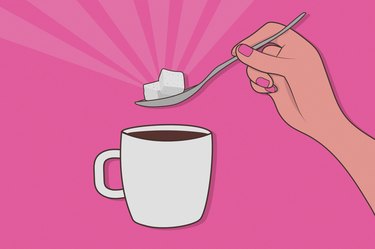
There's a reason a cup of joe makes an appearance on most people's morning ritual: Besides its divine flavor, coffee contains caffeine — the bitter substance that stimulates your central nervous system, making you feel more awake, per the U.S. National Library of Medicine.
As long as you're not exceeding about 4 cups per day, coffee can offer an array of health benefits, including increased energy and potential fat-burning effects. Read on for the health benefits of coffee that can do your body some good.
Video of the Day
Video of the Day
1. Coffee Can Give Your Workouts a Boost
Coffee's ability to alleviate fatigue is why many of us drink a cup before a workout.
The caffeine in coffee has been shown to have performance-enhancing benefits in endurance exercise, according to an April 2013 study in PLOS One. When athletes were given either a caffeine drink, caffeinated coffee or decaf, those who took caffeine and coffee cycled faster.
A cup of coffee can be especially beneficial for short-term, high-intensity exercise, as caffeine may be able to enhance muscular work in both team sports exercise and power-based sports, according to a January 2010 study in the Journal of Strength and Conditioning Research.
In fact, caffeine was shown to be ergogenic for aerobic endurance, muscle strength, muscle endurance, power, jumping performance and exercise speed in a March 2019 systematic review in the British Journal of Sports Medicine. The researchers recommend 2 cups of coffee about an hour before exercising.
2. It's Linked to Improved Cognition
Caffeine has been shown to enhance focus and attention. After testing people's ability to complete simple and complex attention-based tasks, researchers observed that caffeine enhanced cognitive performance, according to a January 2013 study in Psychopharmacology.
Outside of its caffeine content, there's also some evidence that coffee has been associated with neuroprotection and enhanced athletic performance, alertness and mood, says Monica Auslander Moreno, RD, LDN, nutrition consultant for RSP Nutrition.
"It is thought that the antioxidant content in coffee lowers beta-amyloid plaques, which is associated in brain scans for Alzheimer's disease," Moreno says.
While there's a good amount of evidence showing a lower incidence of Parkinson's and Alzheimer's among coffee drinkers, more research is needed to confirm coffee can help prevent or treat these diseases, according to an April 2013 review in Archives of Medical Science.
3. Coffee Is Linked to Longevity
While overall lifestyle plays a key role in lifespan, coffee may support your longevity.
After analyzing 20 studies on coffee intake and mortality, a November 2013 meta-analysis in the British Journal of Nutrition that java drinkers were observed to live longer and experience less disease-induced death.
The study also suggests that high intake of decaffeinated coffee is associated with a lower risk of death, but more research is needed to explain what it is in decaffeinated coffee that promotes longevity.
In addition, researchers followed 508,747 people ages 20 to 79 and found a connection between drinking filtered coffee and lower mortality rates than both drinking unfiltered coffee and not drinking coffee at all, according to an April 2020 study in the European Journal of Preventive Cardiology.
That's great news for java lovers — just make sure to opt for filtered coffee over french press every time.
4. It's Tied to a Reduced Risk of Cancer
Research shows that coffee has several anti-inflammatory properties that are tied to a reduced risk of certain chronic illnesses and cancers.
The chlorogenic acids in coffee and certain fruits and vegetables are associated with a lower incidence of breast cancer among older people, according to a June 2020 study in the Journal of the Academy of Nutrition and Dietetics.
5. It's Linked to a Healthier Heart
Sipping on at least 1 cup of caffeinated coffee a day is linked to a lower risk of heart failure, per a February 2021 Circulation: Heart Failure study.
And drinking between 1 to 5 cups of coffee per day is linked to a lower likelihood of death due to cardiovascular diseases, neurological diseases or suicide, found a November 2015 study in Circulation, which tracked over 200,000 people.
Note that the connections between heart health and coffee can be conflicting and affected by other hidden factors, a small January 2016 review in the Journal of Clinical Nutrition and Dietetics notes. Considering many lifestyle factors play into heart health, it's difficult to conclude that coffee single-handedly supports or harms heart health.
The improvement in blood flow is likely due to coffee's caffeine content. "Coffee has been linked to beneficial effects on cardiovascular disease via improving mechanisms for blood flow and blood vessel dilation associated with lower risks of cerebral and myocardial incidents," Moreno says.
6. It's Linked to a Reduced Risk of Diabetes in Some People
The same November 2015 study in Circulation also suggests that the chlorogenic acids, lignans, quinides, trigonelline and magnesium in both caffeinated and decaf coffee can help reduce insulin resistance and systemic inflammation in the body.
Coffee is linked with a reduced risk of diabetes — but in people with diabetes, it can have variable effects. And, caffeine can be linked to increased blood sugars (due to poor insulin sensitivity), per a July 2019 study in the Journal of Traditional and Complementary Medicine.
What's more, a December 2022 study in the American Journal of Clinical Nutrition of more than 4,500 people observed that a higher coffee intake is tied to a lower risk of type 2 diabetes in people who've had gestational diabetes and are at a higher risk of getting diabetes later in life.
Tip
Just remember to stick to no more than 400 milligrams of caffeine daily. Otherwise, it can have adverse effects on your blood pressure, heart rate and sleep.
7. Coffee Is Associated With Lower Inflammation Levels
Much like red wine, coffee is becoming recognized for its antioxidant content.
In fact, coffee is even richer in antioxidants than red wine and green tea, making a significant contribution to most peoples' total antioxidant consumption, according to a December 2013 study in Antioxidants.
Antioxidants provide protection against free radicals, which are harmful, unstable molecules found in air pollutants like cigarette smoke as well as UV rays from the sun.
These molecules cause oxidative stress and can produce inflammation in the body, according to a June 2015 study in the European Journal of Medicinal Chemistry. And Harvard Health Publishing confirms: The antioxidants in coffee is linked to protecting us against inflammation.
8. Can Coffee Help You Lose Weight?
Although the link between sipping coffee and burning fat requires more extensive research, there have been recent findings that indicate that the caffeine in a cup of joe may help stimulate brown adipose tissue (brown fat), according to a June 2019 study in Scientific Reports.
Brown fat is different from other fat in your body, as it contains more mitochondria than white fat, according to the Cleveland Clinic. The mitochondria are responsible for burning calories to produce heat.
While the general understanding of brown fat requires more research, it appears that brown fat burns white body fat (the fat people look to lose) for fuel. So, by potentially stimulating the brown fat in your body, coffee may help burn white body fat, according to the above-mentioned study.
Some research also shows that the chlorogenic acids in coffee that help promote better insulin control may help with weight loss, too. According to a September 2017 randomized trial in The American Journal of Clinical Nutrition, people who drink coffee often might improve their glucose and insulin metabolism by following a low-fat diet.
Tip
Whether your goal is to lose weight or maintain your health, dousing your cup with sugar, artificial sweeteners and/or too much cream and flavored syrups can cause you to take in extra calories and chemicals — two things that ruin your coffee.
Does Decaf Coffee Provide the Same Benefits As Caffeinated Coffee?
While decaffeinated and caffeinated coffee contain many of the same beneficial compounds and antioxidants that support your health, a majority of the studies on the benefits of coffee are done on caffeinated versions, so more research on decaffeinated coffee is needed.
Note that decaffeinated coffee still has a very small amount of caffeine in it, but it doesn't contain nearly as much as regular coffee.
"There may be some undetermined benefit still present in decaf, but to harness the full health benefits, it appears regular coffee is the name of the game," Moreno says.
For example, a September 2018 study in Nutrients found that decaf and caffeinated coffee both increased alertness, but caffeinated coffee also decreased tiredness and headaches compared to its decaffeinated counterpart. This study suggests that more research is needed to evaluate the compounds in coffee — whether it's caffeinated or not — and their effects.
Some beneficial compounds in caffeinated coffee were higher than in regular coffee, possibly because they are lost during the decaffeination process. Caffeinated coffee had higher levels of antioxidants and compounds that are linked to helping protect against Alzheimer's disease, an August 2014 study in PLOS One found.

How to Buy the Best Coffee
"Seek out coffee with no added sugar, look for the organic seal and ask yourself if any of the additional ingredients support your personal health goals," says Mary Stewart, RD and owner of Cultivate Nutrition in Dallas.
- Watch out for added ingredients. Be sure to watch out for added sugar and additional ingredients when buying bottled and other pre-made drinks (because coffee beans are naturally free of sugar and other ingredients besides coffee). Consider the creamer, milk or sugar as part of your overall calorie and sugar quota for the day, Stewart says.
- Go organic. Preliminary research by the International Coffee Association has found that there are typically 32 chemicals that might be applied to coffee beans to fight off pests. By choosing organic coffee, you can avoid these potentially harmful chemicals.
How to Brew Coffee
Filtered coffee is the healthiest coffee, according to the April 2020 study. Those who drank 1 to 4 cups of filtered coffee were observed to have the lowest mortality rate.
"Filtering your coffee, through using a paper liner, helps to remove compounds in coffee that are associated with increased cholesterol, heart disease and premature death," Stewart explains.
With that in mind, here's how to brew the healthiest cup of coffee via two popular methods.
Standard Coffee Maker
Common in many homes and offices, electric coffee makers (like this Ninja 12-Cup Programmable Brewer; $79.99, Amazon.com) make brewing filtered coffee easy.
- Pour in as much water as you'd like to brew coffee.
- Set a machine-fitting filter in place.
- Measure your medium-coarse coffee grounds, estimating 1 tablespoon per 5-ounce cup you aim to brew.
- Place the coffee grounds in the filter.
- Plug in the machine, ensure the carafe is under the spout and turn on the coffee maker.
- Lift the filter with grounds out of the brewer and discard, then pour your coffee into a cup and enjoy it.
Pour-Over Method
What's old is new. The trendy non-electric coffee brewer ($19.79, Amazon.com) offers more of the java flavor you love than plug-in coffee makers, plus the coffee can be covered and refrigerated to enjoy later.
- Boil water.
- Place the filter into the top portion of the pour-over. Pour a splash of hot water over the filter to seal it to the pot.
- Measure your medium-coarse coffee grounds, estimating 1 tablespoon per 5-ounce cup you aim to brew.
- Place the coffee grounds in the filter, then pour a small amount of water over the grounds to saturate them.
- Slowly pour the hot water over the grounds while keeping the water level safely below the top lip.
- Slowly pour the rest of the water needed to brew the desired amount over the grounds in a circular fashion to evenly soak the grounds.
- Lift the filter with grounds out of the brewer and discard, then pour your coffee into a cup and enjoy.
Just Avoid Getting Too Much Caffeine
Although coffee can have some super health benefits, you'll want to be cap your intake.
As with other stimulants and caffeine sources, getting too much caffeine — aka more than 400 milligrams or about 4 cups per day for most adults, and up to 300 milligrams caffeine per day for pregnant people — can lead to some undesirable side effects, per a November 2017 report in Food and Chemical Toxicology.
For one, drinking too much coffee can cause symptoms like jitteriness, nervousness or irritability, according to the Mayo Clinic.
For some, coffee and caffeine can also cause digestive unrest or gas. And because caffeine can spike your energy levels, coffee can also cause difficulty in falling asleep or even insomnia, according to the Mayo Clinic.
"My clients sometimes use coffee for energy, so I always ask them about diet and sleep habits and whether or not their multiple cups of coffee a day is being used as a substitute for food or lack of sleep," says Laura Burak, RD, CDN, a registered dietitian in Roslyn, New York.
"Coffee can act as a bit of an appetite suppressant so people will drink a cup instead of eating a nutritious snack in an effort to save calories or lose weight — but this will almost always backfire in the end."
If you find yourself short on sleep and compensating with caffeine, focus on setting yourself up for sleep success (by the way, here are 10 habits that are ruining your sleep, plus how to fix them) rather than using the caffeine in coffee as a "Band-Aid," Burak suggests.
Losing sleep several nights in a row (or more) can lead to chronic fatigue, so make sure not to drink java at night if you're particularly sensitive to it. If you are sensitive to caffeine, Moreno recommends sticking to just a 1/2 cup of coffee in the morning — and, of course, without sugar.
- U.S. National Library of Medicine: "Caffeine"
- PLOS One: "The Metabolic and Performance Effects of Caffeine Compared to Coffee during Endurance Exercise"
- Journal of Strength and Conditioning Research: "Efficacy of Acute Caffeine Ingestion for Short-Term High-Intensity Exercise Performance: A Systematic Review."
- Psychopharmacology: "Caffeine As An Attention Enhancer: Reviewing Existing Assumptions"
- Mayo Clinic: "Caffeine: How Much is Too Much?"
- Journal of Nutrition: "Caffeine and Alcohol Intakes and Overall Nutrient Adequacy Are Associated with Longitudinal Cognitive Performance among U.S. Adults"
- Nutrients: "Coffee Consumption and Risk of Dementia and Alzheimer’s Disease: A Dose-Response Meta-Analysis of Prospective Studies"
- Scientific Reports: "Habitual Coffee Consumption and Cognitive Function: a Mendelian Randomization Meta-Analysis in up to 415,530 Participants"
- Circulation: "Association of Coffee Consumption With Total and Cause-Specific Mortality in 3 Large Prospective Cohorts"
- British Journal of Nutrition: "Coffee Consumption and Total Mortality: a Meta-Analysis of Twenty Prospective Cohort Studies"
- Antioxidants: "Antioxidant and Antiradical Activity of Coffee"
- European Journal of Medicinal Chemistry: "The Role of Antioxidants in the Chemistry of Oxidative Stress: A Review"
- Harvard Health Publishing: "Foods That Fight Inflammation"
- American Heart Association: "Is Coffee Good for You or Not?"
- Journal of Clinical Nutrition and Dietetics: "Coffee Consumption and Coronary Heart Diseases: A Mini-Review"
- Scientific Reports: "Caffeine Exposure Induces Browning Features in Adipose Tissue in Vitro and in Vivo"
- European Journal of Preventive Cardiology: "Coffee consumption and mortality from cardiovascular diseases and total mortality: Does the brewing method matter?"
- Proceedings of the National Academy of Sciences: "Synergistic Neuroprotection By Coffee Components Eicosanoyl-5-Hydroxytryptamide and Caffeine in Models of Parkinson's Disease and DLB"
- Journal of the Academy of Nutrition and Dietetics: "Phenolic Acid Subclasses, Individual Compounds, and Breast Cancer Risk in a Mediterranean Cohort: The SUN Project"
- The American Journal of Clinical Nutrition: "Genetic Variation of Habitual Coffee Consumption and Glycemic Changes in Response to Weight-Loss Diet Intervention: The Preventing Overweight Using Novel Dietary Strategies (POUNDS LOST) Trial"
- Nutrients: "The Acute Effects of Caffeinated Black Coffee on Cognition and Mood in Healthy Young and Older Adults"
- PLOS One: "Gas Chromatography Time-Of-Flight Mass Spectrometry (GC-TOF-MS)-Based Metabolomics for Comparison of Caffeinated and Decaffeinated Coffee and Its Implications for Alzheimer’s Disease"
- British Journal of Sports Medicine: "Wake up and smell the coffee: caffeine supplementation and exercise performance—an umbrella review of 21 published meta-analyses"
- Archives of Medical Science: "Can coffee consumption lower the risk of Alzheimer’s disease and Parkinson’s disease? A literature review"
- Journal of Traditional and Complementary Medicine: "Effects of coffee consumption on glucose metabolism: A systematic review of clinical trials"
- Food and Chemical Toxicology: "Systematic review of the potential adverse effects of caffeine consumption in healthy adults, pregnant women, adolescents, and children"
- Circulation: Heart Failure: "Association Between Coffee Intake and Incident Heart Failure Risk"


